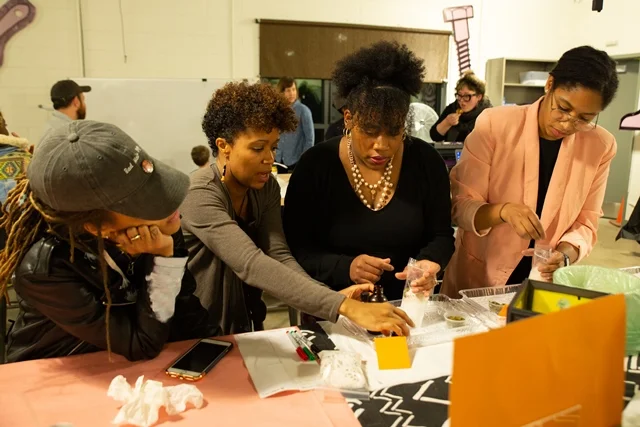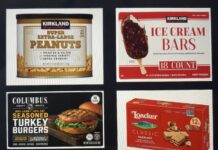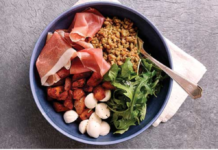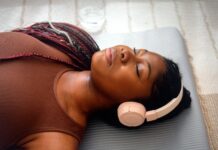Urban Media Today is excited to introduce its series highlighting the Heinz Endowment Cultural Treasure Initiative Award Winners. Like Heinz, we are inspired by each organization’s work and commitment to Black creativity and cultural legacy. For our first feature, Urban Media spoke with Ujamaa Collective Executive Director, Lakeisha Wolf.
NOTE: This interview has been edited for length and clarity.
UM: I would just like to give you your flowers! Your organization, Ujamaa Collective, has received support from several cultural foundations and institutions like The Heinz Endowment, Pittsburgh Foundation, and the Mellon Foundation, to name a few. I think that speaks a lot to what you’ve been able to do in these 15 years. When the Heinz Endowment awards were announced, Vice President Janet Sarbaugh said, “These cultural treasures are diverse in their connections to black culture, to artistic disciplines in their longevity, and in many other ways. What they have in common is a commitment to ensuring the presence of black art and culture and our city and region.” To what do you attribute your longevity?
LW: It would be to our principles and putting our principles into practice. Being able to initiate and build a nonprofit that centers Black people and Africana culture in this city is really a feat. I’m honored and privileged to do this kind of work. All of our staff and creative members know that it’s really a privilege for us to be able to do this here in Pittsburgh. Especially recognizing the challenges to Black women and Black people in general and the consistent disinvestment in Black communities over decades. So, I count my blessings.
At Ujamaa, we’re working hard not just to center Black people but to center the wellness of Black people. Culture is the summation of all that we do. How we show up in the world and the lens through which we see ourselves, and our relationship to everything. Our relationships to other people, our relationship to our families, our communities, the environment, and nature, all of those things are cultural relationships. It’s really important that we look at what cultural space we are building out of. We said, let’s peel back these layers and look at the ways in which Black women were exchanging with each other and with their communities before colonization. The policies for our marketplace are Adinkra symbols. They were taken from multiple symbols out of Ghana and the wisdom of those things because we really wanted to root our business in our work and something that speaks to the highest ideals of what it means to be a person of African descent.
UM: In this age with social media, we see the rise of hustle culture and girl boss philosophy, plus the climate of COVID created the great resignation, with many people deciding entrepreneurship as a viable option to create a different and maybe better life. How do you continue to grow your collective model in this climate?
LW: We have many mottos here, and one of them is “We are who we seek to serve.” Cooperatives are like self-help enterprises. You’re working to meet a need that you have. But in the cooperative, we are the people who needed the help and who got together to create this thing for ourselves. We try to consistently remind folks that we are also Black women living in Pittsburgh, dealing with the same messages about being an individual, the same messages about grind culture, the same messages about competition. And we do our best to nurture the values that we consider to be right. And through practice, we’ve seen (our model) proven to be a healthier message. The idea of grind culture and the system of capitalism is to have you be a worker and not an owner. We say to our members that we want our members to own the work we do. That’s really important. Shared work is shared wealth. Wealth is not just money; it’s multiple benefits.
With the African Centered Cooperative Research Project (ACCRP), we’re trying to gauge how Black people see ourselves in the region because we know that there are a lot of ways in which Black folks collaborate and work together all the time. We know that there’s a housing crisis across America, but what can we be doing? What could we be doing that isn’t necessarily about somebody making the highest profit possible off of something that is a basic quality of life? After the (ACCRP initial) surveys, we’re going to host some focus groups. Whether they’re in business, whether they’re running a nonprofit or, or even if it’s an unassociated group of people with an idea to meet some kind of need for other Black people. We want to talk to those folks in small group focus groups and lift up the ideas and the ways in which people are working and share those stories. Then we plan to host community conversations. How can we begin to think about and conceptualize something new, something different? Or if folks say, “I’m already doing X, Y, and Z,” how can we share what they’re doing? How can other folks come around and support that? How can we duplicate that? When we talk about values and principles that are rooted in sharing, people need to practice doing that because it really is a cultural shift.
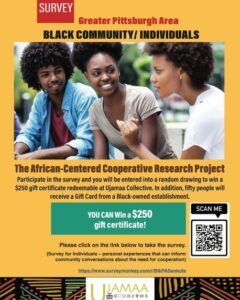
UM: I think every Black woman who has lived and is living in Pittsburgh is aware of the 2019 report (by Pittsburgh’s Gender Equity Commission) that essentially said Pittsburgh was the worst city for Black women. Since then, Pittsburgh elected its first Black mayor, and there’s also been the announcement of the Rebuilding American Infrastructure Program that will bring lots of development money to the Hill District. What do you think the implications of that are for your organization and Black women in Pittsburgh?
LW: I commend having Black people in lots of places. There are significant things that can happen, but sometimes it’s just not enough. We need structural changes, and those changes are necessary at a real foundational level. It will only change if people do the cultural changing. Power is always in the group. The solution is always in the group. Everybody has a piece of it. I feel like I’m about the business of Black people. I’m about the business of creativity. I’m about the business of building community. Those values come first. I’m not motivated by money. I’m motivated by affirmed and healthy Black people. I want people to make money because people see the value in what you created, and they see the value in who you are, and they want to support you. Not just because you’re making a beautiful thing, but because they want to be in the right relationship and share the same values and principles. People come into our shared boutique space to interact with all these beautiful, handmade quality pieces of merchandise. There’s a story of a Black person. The story of that individual person or that small business that made this thing. It becomes an intersection to talk about and an exchange of value. Because being cooperative is relational. You have to be in relationship with people and in right relationship with folks. So, relationship is a huge part of our focus.
UM: In addition to the African Centered Cooperative Research Project, what programs and projects are Ujamaa currently working on?
LW: Our creative women members are currently working on a collective gift box. It’s going to be full of goodies that the members are creating together. Our members already have all of their various goods that we sell in our boutique, but we’re also creating some new lines of products specifically for the ultimate gift box. There will be two boxes. One is for just adults, and another one is going to be a family box. The boxes will be valued at probably over $200 but most likely be sold for $150. There will be multiple products—wellness products for the body, teas, home decor, jewelry, etc. There will be a wealth of things that can be kept or shared. We will be doing pre-orders.
Our members plan and develop their workshops, so we have one that’s coming up on Saturday, September 10th. Teresa Poindexter runs a business called The Life Potion. She does herbal teas and tinctures and products for building the immune system. The following workshop will be crocheting offered by two of our members who are excellent crocheters. We’ll probably be doing another sewing series this fall/winter.
We’re also working on a partnership with Pittsburgh Public Theater right now for their production of A Raisin in the Sun in October. Many of our members and artists in our network are going to do a special night of vending.
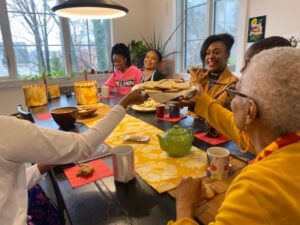
UM: Ujamaa is named after the fourth principle of Kwanzaa. The sixth principle is Kuumba: “To do always what we can in the way we can, in order to leave our community more beautiful and beneficial than we inherited it.” How do you feel that the Ujamaa Collective has done that?
LW: Even though we are named after the fourth principle, none of the principles operate independently. You really have to employ them all for any of them to be able to really shine bright in your work. I feel like one of the things that we’ve done well has been to make our community more beneficial in a tangible way is being able to maintain this retail boutique for artists right on Center Avenue in a neighborhood that is not yet a destination neighborhood. One of our objectives when we first started this work was that we wanted Ujamaa to become a regional destination. I truly believe that we have accomplished that in the past 15 years. We have received people from across the country and really around the world. It’s really been an amazing journey. Our board members over the years have been extremely instrumental in helping us make different kinds of connections. One of those people I’ll shout out is Terry Baltimore. She’s absolutely amazing. She’s not on our board anymore but served for a number of years and was one of the first folks who really helped to create and hold space for us.
We’ve strengthened and affirmed relationships and have helped folks to see the possibilities. I think it’s a Maya Angelou saying, “People will remember how you made them feel,” and I think that’s because of how we center Black people. I feel like we’ve been able to achieve this feeling of home, meaning a place where you can be authentic, where you can be yourself, where you can be and receive love, and where you can experience joy that’s not tethered to the work you do.





















